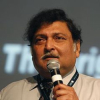Sugata Mitra

Sugata Mitra
Sugata Mitrais Professor of Educational Technology at the School of Education, Communication and Language Sciences at Newcastle University, England. He is best known for his "Hole in the Wall" experiment, and widely cited in works on literacy and education. He is Chief Scientist, Emeritus, at the for-profit training company NIIT. He won the TED Prize 2013...
NationalityIndian
ProfessionEducator
Date of Birth12 February 1952
CountryIndia